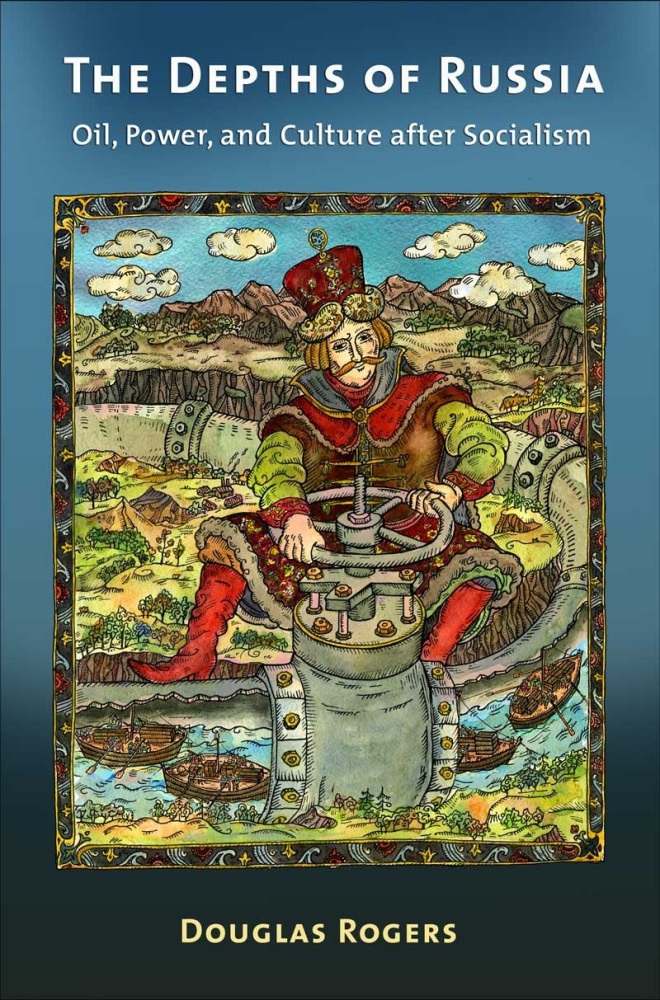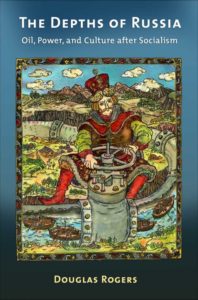
 Oil, corporate power, and shifting corporate/state alignments are all urgent twenty-first century themes, implicated and embedded in Europe’s current intersecting crises. Recent scholarship has traced these topics from a variety of angles, for example, by looking at the historic entanglements of oil and democracy, as well asoil’s role in the making and unmaking of the Keynesian industrial state (see Timothy Mitchell’s Carbon Democracy), through ethnographic examinations of corporations and the corporate form (Stuart Kirsch’s Mining Capitalism, Marina Welker’s Enacting the Corporation), or finance capital (Karen Ho’s Liquidated).
Oil, corporate power, and shifting corporate/state alignments are all urgent twenty-first century themes, implicated and embedded in Europe’s current intersecting crises. Recent scholarship has traced these topics from a variety of angles, for example, by looking at the historic entanglements of oil and democracy, as well asoil’s role in the making and unmaking of the Keynesian industrial state (see Timothy Mitchell’s Carbon Democracy), through ethnographic examinations of corporations and the corporate form (Stuart Kirsch’s Mining Capitalism, Marina Welker’s Enacting the Corporation), or finance capital (Karen Ho’s Liquidated).
Douglas Rogers’ excellent new book enters this realm to provide a different and distinctive story about the intersection of these themes, exploring the unique ways oil, culture, and power intersect after socialism.
The Depths of Russia investigates Russia’s “oil culture” and its role in the production of the new Russian state.
The Depths of Russia investigates Russia’s “oil culture” and its role in the production of the new Russian state. Russia’s oil boom of the 2000s was central to Putin-era state-building; indeed, oil wealth was central to Putin’s legitimacy and fueled Russia’s nationalist reassertion. However, this is not a story of power, money, and the political center. Rather, its focus is firmly on the regions.
The Depths of Russia is based on a case study of the Perm region in the Urals where Rogers has undertaken ethnographic research for more than twenty years, focusing on the oil corporation that came to define it, Lukoil-Perm. Perm was a “closed” city during the Soviet period. Despite the importance of oil to the region (oil was first discovered in Perm in 1929 and flowed steadily until the 1970s), it was primarily known for its defense and industrial contributions, and oil was not central to its identity. This changed during the post-socialist period, as Lukoil-Perm (a regional subsidiary of the Moscow-based multinational Lukoil) emerged to become a central node in Russia’s powerful post-socialistpost-ocialist oil complex.
This important three-part book traces oil’s status from the socialist period to the Putin era (1999-2012), focusing on the practices and projects of the emergent state-corporate-cultural elite whose actions have done so much to reshape the political field in Russia. The Depths of Russia is a work of historical ethnography that is attentive to multiple spatial and temporal scales. The extended duration and “depth” of Rogers’ own relationships in Perm region enabled him to track key individuals and networks, and to gain extraordinary access and insights. Prevented from doing the corporation-based research he set out to undertake, Rogers made a virtue of denied access, tracking oil and the projects it became associated with along diverse and labyrinthine paths—into state archives, museums—and examining the works of cultural production that ensued. The result is a study of oil and the state (the likes of which we’ve not seen before),an entirely novel and fresh rendering of topics about which scholars and commentators alike will be compelled to read.
A central theme—and one of the book’s major contributions—is to highlight the unique place of oil in socialist and post-socialist Russia.
A central theme—and one of the book’s major contributions—is to highlight the unique place of oil in socialist and post-socialist Russia. Oil has been central to state-building, but not in the ways we might expect. Mobilizing insights from anthropological works on exchange and post-socialism, Rogers draws out the distinctiveness of “socialist oil.” Due to the complexities of central planning, oil was a comparatively insignificant industrial sector and didn’t have the prestige, symbolic importance, or political clout as in capitalist contexts. Moreover, since proceeds didn’t return to the regions, the oil sector was never the basis for the emergence of powerful elites. Issues endemic to post-colonial petrostates (think “resource curse”), did not come into play here. As Rogers writes, “Soviet citizens did not experience oil as directly associated with massive inequalities, destabilizing influxes of money, soaring expectations of rapid modernization, or grand cultural spectacles” (xiii). The book’s first chapter traces this seeming paradox and unpacks the “riddle” socialist oil presents—attentive to the political economy it was situated within.
Chapter Two traces oil’s shifting status after the Soviet Union’s dissolution, focusing on the practices of exchange and circulation that emerged at this time, as oil was bartered or used as a surrogate economy. Barter was a common survival strategy for enterprises in the late socialist and early post-socialist period—but here, it had unique cultural significance. Rogers is interested in the “entangling of oil and human imaginations and possibilities” (xiv). To literatures on oil and petrostates, The Depths of Russia contributes a novel approach, one that examines oil’s materiality in a fresh new way and allows for the place it has occupied in human social and cultural life. He argues that this distinctive aspect of oil’s materiality—the way it was exchanged and flowed between people—became central to Perm’s regional identity in the post-socialist period, central to the emergent state-corporate-cultural elite’s efforts to legitimize itself and reimagine the Perm region. In this way, Rogers argues that oil “remade” Perm in the post-socialist period; oil’s barter helped to “unimagine” the federal state, by indexing “locality, regional imaginariesand the ability to stand up against international and national centers of power” (100).
The Depths of Russia is a study of relationships and connections; Rogers’ preoccupation throughout is on tracing networks of social relations, the morphing state/corporate forms they give rise to, and the complex interactions that ensue.
The Depths of Russia is a study of relationships and connections; Rogers’ preoccupation throughout is on tracing networks of social relations, the morphing state/corporate forms they give rise to, and the complex interactions that ensue. Rogers shows how late socialist era forms of exchange such as petrobarter became important sites of state-corporate entanglement in the post-socialist period. Indeed, oil’s use as a surrogate currency at this time generated regional networks that linked it to other people, objects and places, blurring and blending the state and corporation in interesting ways.
Parts Two and Three pick up this tale of Lukoil-Perm’s morphing corporate form, and reveal the intensely symbiotic relationship between corporation and state that ensues. Here, we see how through a series of Corporate Social Responsibility (CSR) projects, Lukoil-Perm took on many of the roles of the state, resulting in a uniquely deep penetration of state-corporate ties. Crucial are the “cultural managers,” Ministry of Culture staffers who shuttle back and forth between their formal gigs and Lukoil-Perm, blending roles as they engage in these projects. The state’s involvement in what was known as the “project movement” marked a new technique of governance that the Putin administration adopted to re-establish control over the regions, yet it intersected with regional logics and processes as well. Against the determinism of so many accounts of Putin-era Russia, the book tells a rich and subtle story of improvisations. We meet a diverse range of actors (“red directors,” financiers, former Komsomol activists, cultural workers, (neo)liberal governors, oil-rich billionaire patrons of the arts and former punk ethnofuturists), who find themselves empowered at different moments over the decades the study traces. Chapters trace the distinctive state-corporate entanglements (at the level of funding, projects and metaphor) that result from their encounters.
A central focus is on the cultural projects that succeeded nineties-era petrobarter as the key domain for Perm’s identity-building process. Some of the book’s most compelling and lively sections trace the cultural projects of the Putin-Medvedev period and the projects that took shape as state officials worked (via Lukoil) to put Perm “back on the map.” Attentive to the unique aspects of post-socialist oil’s materiality, Rogers attends to the representational strategies local actors adopted as they crafted cultural heritage projects. Depth (associated with the region’s oil deposits) and connectivity (associated with natural gas pipelines) were prominent metaphors, adopted to signal first, the corporation’s legitimacy and rootedness in the region (its association with hydrocarbon deposits), and its commitment to local communities by fostering new patterns of sociability as well.
The Depths of Russia makes original and substantial contributions to the literatures it engages: interdisciplinary literatures on oil; scholarship on states and corporations; works that examine the politics of culture and cultural production. Rogers’ formulation of “socialist oil” will be a valued contribution to scholarship on petrostates. There is much here to excite the interest of scholars of post-socialism also. The book forges a creative and fresh path, engaging topics that have been central to it (neoliberalism, civil society), but without getting bogged down in them. There is an extremely compelling argument here about continuity of form between the internationally sponsored civil society projects of the 1990s and the state-corporate formations of the 2000s. Here, the technologies of international foundations and agencies (“cultural and social projects”) become incorporated into a project of regional state building, in which Lukoil-Perm ultimately joins to play a major role. These discussions will be of great interest to scholars of civil society and those tracing the complex afterlife of 1990s era democracy promotion in the region.
The book dispenses handily with many of the tired clichés of Putin-era Russia, firstly, by locating Russia squarely within global trends (shifting relationships between state, society and capital, and corporate governance).
The book dispenses handily with many of the tired clichés of Putin-era Russia, firstly, by locating Russia squarely within global trends (shifting relationships between state, society and capital, and corporate governance). Second, at a time when so much scholarly attention is fixed on the political center, The Depths of Russia advances important arguments about the role of the regions. In synch and in dialogue with other recent works that take energy and infrastructure as objects -Steven Collier’s recent Post-Soviet Social, and Suzanne Wengle’s Post-Soviet Power—Rogers brings a welcome lens to the topic of post-Soviet Russia’s state-formation. The Russian state, Rogers demonstrates, is produced by regional/center dynamics.
The Depths of Russia is a big book that tackles big themes and tells a story of considerable intricacy, yet it is well conceived, well organized, and extremely well-written. The three parts hold together well, linked by a strong narrative thread. The tactic of comparison between capitalist, post-colonial petrostates and (post)socialist oil works very successfully, inviting the reader to contemplate “what they know” about corporations, the Russian state or oil, and serves as a good mooring device. The book, which will be required reading for scholars of post-socialism and Russian politics, is equally inviting to those interested in shifting state/corporate forms, or petrostates.
Reviewed by Julie Hemment, University of Massachusetts Amherst
The Depths of Russia: Oil, Power and Culture after Socialism
by Douglas Rogers
Cornell University Press
Paperback / 394 pages / 2015
ISBN: 9780801456589
To read more book reviews, please click here.
Published on November 1, 2016.




